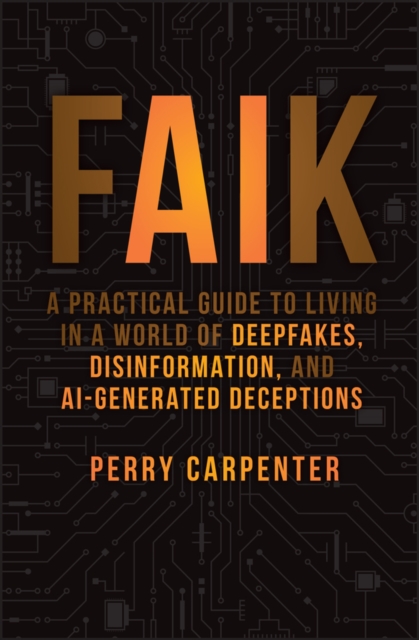
AI as a target, web-based attacks and deepfakes -- cybersecurity predictions for 2026
The very nature of cybersecurity makes it a constant arms race between attackers and defenders and recently that’s meant both sides utilizing AI.
This seems unlikely to change in 2026 but what else might we expect? Some industry experts give us their views.

Responding to the challenge of deepfakes [Q&A]
Recent advancements in publicly available AI models have made it incredibly easy to generate deepfakes -- so much so that attackers don’t need to be technical experts to pull off convincing deception campaigns.
Attackers can scrape public content to recreate someone's voice or face, and inject that fake identity into virtual meetings, phone calls, or even training videos.

Alibaba launches new open-source tool that turns photos into video
Alibaba has released a new open-source speech-to-video model capable of generating animated digital humans from a single portrait and an audio clip. The tool is aimed at content creators and researchers who are looking for a way to produce lifelike avatars capable of speaking, singing, or performing.
The Wan2.2-S2V release builds on Alibaba’s Wan2.2 video generation series. By becoming open-source, the company is offering developers a system that can animate portraits across different perspectives including close-up, bust, and full-body shots.

Less than a third of organizations are prepared for deepfake attacks
Nearly 40 percent of organizations admit they are underprepared for AI-driven threats such as automated attacks, deepfake-based videos, and voice scams, according to new research from LevelBlue.
The new findings show that while awareness of these dangers is growing, many companies remain vulnerable and lack confidence in their ability to defend against them.

International collaboration aims to combat deepfakes and AI misuse
There’s increasing concern about the use of deepfakes and artificial intelligence to spread misinformation and contribute to fraudulent activity.
Today at the AI for Good Global Summit in Geneva, the AI and Multimedia Authenticity Standards Collaboration (AMAS), a global, multistakeholder initiative led by the World Standards Cooperation has today launched two flagship papers offering recommendations to guide the governance of AI globally and combat mis-and-disinformation.

AI-generated deepfakes used to drive attacks
As generative AI tools have become more powerful, affordable and accessible, cybercriminals are increasingly adopting them to support attacks, these range from business fraud to extortion and identity theft.
A new report from Trend Micro shows that deepfakes are no longer just hype but are being used in real-world exploitation, undermining digital trust, exposing companies to new risks, and boosting the business models of cybercriminals.

IRONSCALES launches deepfake protection to combat social engineering attacks
Deepfake-driven social engineering attacks continue to gain momentum but technical solutions to the issue have so far been slow to emerge.
A recent study from IRONSCALES found that traditional Secure Email Gateways (SEGs) fail to stop an average of 67.5 phishing attacks per 100 mailboxes every month. The company is announcing the launch of a new product offering deepfake protection for enterprise email security.

Deepfakes and how to deal with them [Q&A]
With deepfakes getting more sophisticated and harder to detect both organizations and individuals are at risk of falling victim to fraud and phishing attempts.
We spoke to SURF Security CTO, Ziv Yankovitz, to learn more about the increasing threat of deepfakes and best practices that can be used to for combat attacks.

Cybercriminals try to cash in with sophisticated tax scams
It's that time again, as we approach the end of the tax year scammers are seeking to cash in with a raft of phishing emails, deepfake phone calls, and fake tax prep websites.
New research from McAfee shows 23 percent of Americans say they or someone they know has lost money to a tax scam and 61 percent of victims have lost more than $1,000.

Deepfake fraud calls target consumer cash
AI-generated voice impersonation scams are an increasing threat, with 31 percent of US consumers, 27 percent of Canadians, and 26 percent of UK consumers reporting encounters with deepfake fraud calls.
A new report from Hiya, based on data from the company's Voice Intelligence Network and a January 2025 survey of 12,000 consumers across the US, Canada, the UK, Germany, France, and Spain, shows that more than 30 percent of those targeted fell victim, suffering significant financial losses. In the US, the average reported loss was $539, while UK victims faced the steepest losses at £1,479 ($1,867).

Deepfake fraud attempts grow over 2,000 percent
Financial institutions are facing a significant increase in deepfake fraud attempts, which have grown by a staggering 2,137 percent in the last three years.
Data from Signicat based on responses from 1,200 people in the financial and payment sectors across seven European countries, including the UK, shows that account takeover is the leading type of fraud their customers are exposed to, followed by card payment fraud and phishing.

Deepfakes, workforce fraud and phishing incidents on the rise across businesses
Half of businesses have reported a growth in deepfake and AI-generated fraud, alongside rising biometric spoofs and counterfeit ID fraud attempts, according to the 2025 State of Identity Fraud Report, released today by AuthenticID.
The report analyzes internal proprietary data anonymized from AuthenticID's identity verification and fraud detection technology. When paired with insights from annual fraud surveys of both fraud and technology professionals as well as consumers in North America, the report offers a comprehensive view of the fraud landscape.

Operational tech under attack, deepfake phishing and learning to use passkeys -- cybersecurity predictions for 2025
With a constant power struggle between attackers and defenders cybersecurity is a fast-moving area. That makes it notoriously hard to predict what might happen, but that doesn't stop us trying. Here are what some industry experts think the cybersecurity world has in store for 2025.
Sasha Gohman, VP, research at Cymulate, thinks ransomware will become obsolete. "Ransomware may become obsolete due to the fact that decrypting your important files may become a feasible task with quantum computing. On the other hand, ransomware operators may then choose to encrypt your important files with quantum-resilient encryption."

Businesses not confident in their ability to detect deepfakes
Nearly half of businesses admit they are only partially confident in their ability to detect deepfakes, leaving them vulnerable to escalating fraud risks according to a new report.
The report from identity solutions company Regula shows 59 percent of businesses consider video deepfakes a serious threat, while 58 percent feel the same about audio deepfakes.

Navigating the world of disinformation, deepfakes and AI-generated deception [Book Review]
Online scams aren't anything new, but thanks to artificial intelligence they're becoming more sophisticated and harder to detect. We've also seen a rise in disinformation and deepfakes many of them made possible, or at least more plausible, by AI.
This means that venturing onto the internet is increasingly like negotiating a digital minefield. With FAIK, risk management specialist at KnowBe4 Perry Carpenter sets out to dissect what makes these threats work and the motivations behind them as well as offering some strategies to protect yourself.
